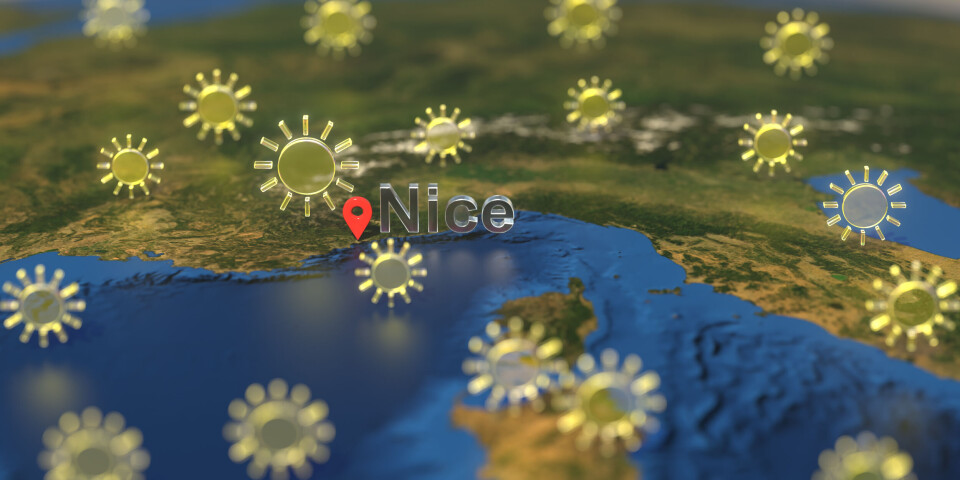-
Is it time to stop changing the clocks in Europe?
Campaigners say it would help improve health and also reduce traffic accidents
-
Gisèle Pelicot memoir hits sales top spot in France
The book, which has been translated into 22 languages, left Queen Camilla ‘speechless’
-
New tax on deliveries from outside EU: How will it affect customers?
The new charge will apply to all deliveries valued under €150
French TV changes weather forecast to include climate change context
The new segment comes as part of France Télévisions’ efforts to raise awareness of climate change

Two French television channels have changed their daily weather bulletins to include context on the impacts of climate change.
France 2 and France 3 made the change on Monday (March 13), calling the segment ‘a weather and climate update’ (journal de la météo et du climat).
The aim is to better explain the consequences of climate change on the weather, said France Télévisions.
🥁📺☀️ Tout à l'heure, @anais_baydemir présentait la météo de #Telematin à l'occasion du lancement du #JournalMeteoClimat ce soir à 20h40 sur @France2tv et 21h sur @France3tv. Reportages, analyses, graphiques... Vous pourrez même intervenir avec ➡️ #OnVousRepond ! @Francetele pic.twitter.com/19XLfZRNQu
— Telematin (@telematin) March 13, 2023
Alexandre Kara, director of the group, told AFP: “It’s about explaining the weather differently; not just saying: ‘It will be fine tomorrow or it will rain’, but also to explain why.”
The programme will now also include “figures and data, we could cover temperature anomalies, the dry water table, or explain winter drought.”
The presenters will also respond to questions from viewers, and internet users under the hashtag #OnVousRépond (We reply to you).
These updates will initially be included in evening forecast segments. They will add around 90 seconds to the France 2 programme, and two minutes to the one on France 3. They will eventually be included in daytime forecasts too.
“We can’t keep doing the forecast as it’s always been done,” added Mr Kara. “It’s unacceptable to be happy about the fact that it’s 25 degrees in Biarritz in February, without explaining why.”
🌎🌿 #Environnement l Face à l'urgence climatique, @Francetele poursuit son engagement et lance le #JournalMétéoClimat !
— France Télévisions (@Francetele) March 13, 2023
Un journal météo enrichi : chiffres, analyses et reportages sur la crise climatique.
Dès ce soir à 20h40 sur @France2tv et 21h sur @France3tv pic.twitter.com/SugCS6QexQ
France Télévisions called upon several experts to help it make the change.
This included Christophe Cassou, a climate researcher at France’s National centre for scientific research (Centre national de la recherche scientifique), who said: “We are experiencing climate change, we can feel it in our daily lives, now, everywhere, it is intensifying. The weather is part of this dynamic and….from now on, all France TV's weather reports will integrate this reality.”
In a series of tweets, he said: “Daily temperatures, the forecast, are influenced by planetary reheating caused by CO2 emissions by human activity. We needed to change weather forecast programmes, which have remained largely unchanged for 30 years.”
Les fluctuations quotidiennes du temps, la météo, sont influencées par le réchauffement planétaire dû aux émissions de CO2 par les activités humaines.
— Christophe Cassou (@cassouman40) March 13, 2023
C’était une évidence; il fallait faire évoluer les bulletins météo qui ont peu changé depuis 30ans.
Ça commence ce soir!
2/
Climate change ‘strategy’
This inclusion of climate notes is a “strategic priority” for France Télévisions, the director said. He added that this information is already part of the news output, including its TV and magazine content.
The FranceInfo website already lets users look at today’s weather, and compare it to the same day and temperature from the past few decades, to show changing trends.
The company is also taking steps to reduce climate change.
Mr Kara said: “Except for extremely breaking news, we will no longer use planes for reporters within the mainland (of France). We will ask everyone to take the train.”
Staff are also set to receive training on climate change and how to save energy.
Read also
French TV news gives weather report-style electricity usage updates
French TV predicted hot weather for 2050…but we’re almost there now
























